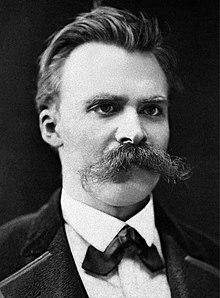Histoire moderne

| Type | |
|---|---|
| Partie de |

L'histoire moderne, la période moderne ou l'ère moderne, est une époque historique dans l'approche linéaire, globale et historiographique de l'horizon temporel après l'histoire post-classique (en)[1],[2]. Ce point de vue contraste avec la vision « organique », ou non linéaire, de l'Histoire proposée pour la première fois par le célèbre philosophe et historien Oswald Spengler, au début du XXe siècle[3]. L'histoire moderne succède à la période historique du Moyen Âge et peut être décomposée en deux périodes :
- L'époque moderne tôtive[note 1], aussi appelé « époque moderne » par les historiens français, a commencé approximativement au début du XVIe siècle ; les jalons historiques notables comprennent la Renaissance européenne, les grandes découvertes et la Réforme protestante.
- L'époque moderne tardive a commencé vers le milieu du XVIIIe siècle ; les jalons historiques notables comprennent la révolution américaine, la Révolution française, la révolution industrielle et la Grande divergence (en). Il a fallu toute l'histoire de l'humanité jusqu'en 1804 pour que la population mondiale atteigne 1 milliard d'habitants ; le milliard suivant est arrivé un peu plus d'un siècle plus tard, en 1927[4].
L'histoire contemporaine, quant à elle, est l'ensemble des événements historiques survenus depuis environ l'année 1945 qui sont immédiatement pertinents pour le présent.
Annexes
[modifier | modifier le code]Articles connexes
[modifier | modifier le code]- Timeline of world map changes (en)
- Histoire de la littérature moderne (es)
- Modernisme culturel : Premodernity, Modernisme, Postmodernisme
Bibliographie
[modifier | modifier le code]Général
[modifier | modifier le code]Livres
[modifier | modifier le code]- Earle, Edward Mead. An Outline of Modern History; A Syllabus with Map Studies. New York: Macmillan Co, 1921.
- Grosvenor, Edwin A. Contemporary History of the World. New York and Boston: T.Y. Crowell & Co, 1899.
- Taylor, William Cooke, Charles Duke Yonge, and G. W. Cox. The Student's Manual of Modern History; Containing the Rise and Progress of the Principal European Nations, Their Political History, and the Changes in Their Social Condition; with a History of the Colonies Founded by Europeans. 1880.
- Arthur Bryant, The Age of Elegance, vol. 2, New York and Boston, (OCLC 14763324), p. 54
Site web
[modifier | modifier le code]- Internet Modern History Sourcebook, fordham.edu
- Boyd, Andrew, Joshua Comenetz. An atlas of world affairs. Routledge, 2007. (ISBN 0-415-39169-5)
- Black, Edwin. Internal Combustion: How Corporations and Governments Addicted the World to Oil and Derailed the Alternatives. New York: St. Martin's Press, 2006.
- Briggs, Asa, and Peter Burke. A Social History of the Media: From Gutenberg to the Internet. Cambridge: Polity, 2002.
- Barzun, Jacques. From Dawn to Decadence: 500 Years of Western Cultural Life : 1500 to the Present. New York: HarperCollins, 2001.
- Burke, Peter. A Social History of Knowledge: From Gutenberg to Diderot. Cambridge, UK: Polity, 2000.
- CBS News. People of the century. Simon and Schuster, 1999. (ISBN 0-684-87093-2)
- Wang, Ke-wen. Modern China: an encyclopedia of history, culture, and nationalism. Taylor & Francis, 1998. (ISBN 0-8153-0720-9)
- Huffman, James L. Modern Japan: an encyclopedia of history, culture, and nationalism. Taylor & Francis, 1998. (ISBN 0-8153-2525-8)
- Schlesinger, Arthur M. New Viewpoints in American History. New York: Macmillan, 1922.
- Nock, Albert Jay. The Myth of a Guilty Nation. B.W. Huebsch, Incorporated, 1922.
- Bakeless, John Edwin. The Economic Causes of Modern War; A Study of the Period: 1878–1918. New York: Printed for the Department of political science of Williams college, by Moffat, Yard and Co, 1921
- Day, Clive. A History of Commerce. New York [etc.]: Longmans, Green, and Co, 1921.
- Moore, Edward Caldwell. The Spread of Christianity in the Modern World. Chicago, Ill: University of Chicago Press, 1919.
- Muir, Ramsay. The Expansion of Europe; The Culmination of Modern History. Boston: Houghton Mifflin Company, 1917.
- Palat, Madhavan K., Social Identities in Revolutionary Russia, ed. (Macmillan, Palgrave, UK, and St Martin’s Press, New York, 2001).
- Palat, Madhavan K., History of Civilizations of Central Asia, ed., vol. 6, Towards the Contemporary Period: From The Mid-Nineteenth Century To The End Of The Twentieth Century, UNESCO, Paris 2005.
- Robinson, James Harvey, and Charles Austin Beard. Readings in Modern European History; A Collection of Extracts from the Sources Chosen with the Purpose of Illustrating Some of the Chief Phases of Development of Europe During the Last Two Hundred Years. Boston: Ginn & Co, 1908.
Liens externes
[modifier | modifier le code]Généraux
[modifier | modifier le code]- Vistorica – Timelines of European modern history
- Journal of Contemporary History. SAGE Publications. (ISSN 1461-7250) (version papier (ISSN 0022-0094))
- Contemporary History Institute (CHI). ohiou.edu (ed., Analyzes the contemporary period in world affairs—the period from World War II to the present—from an interdisciplinary historical perspective.)
- China and Europe, 1500–2000 and Beyond: What is Modern?. Université Columbia
Notes et références
[modifier | modifier le code]Notes
[modifier | modifier le code]- (en) Cet article est partiellement ou en totalité issu de l’article de Wikipédia en anglais intitulé « Modern history » (voir la liste des auteurs).
- De l'anglais (en) « Early modern period »
Références
[modifier | modifier le code]- (en) Intrinsic to the Anglais, "modern" denotes (in reference to history) a period that is opposed to either ancient or medieval; modern history is the history of the world since the end of the Middle Ages.
- (en) « The Century Dictionary and Cyclopedia »
- (en) Spengler, Oswald (1926). The Decline of the West. New York: Alfred A. Knopf, Inc.
- (en) « World Population to Hit Milestone With Birth of 7 Billionth Person », sur PBS.org (consulté le )
